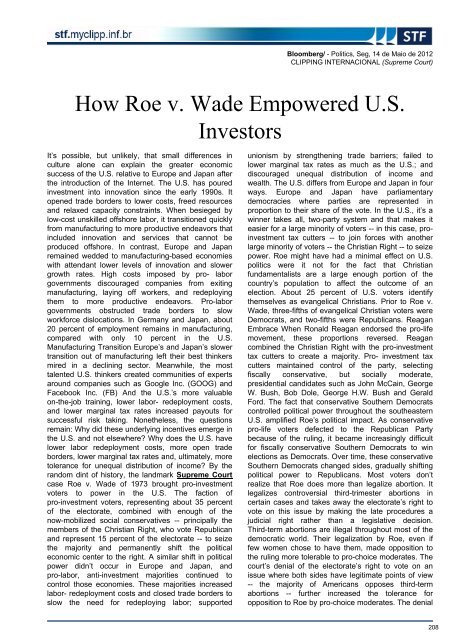10/05/2012 - Myclipp
10/05/2012 - Myclipp
10/05/2012 - Myclipp
Create successful ePaper yourself
Turn your PDF publications into a flip-book with our unique Google optimized e-Paper software.
Bloomberg/ - Politics, Seg, 14 de Maio de <strong>2012</strong><br />
CLIPPING INTERNACIONAL (Supreme Court)<br />
How Roe v. Wade Empowered U.S.<br />
Investors<br />
It’s possible, but unlikely, that small differences in<br />
culture alone can explain the greater economic<br />
success of the U.S. relative to Europe and Japan after<br />
the introduction of the Internet. The U.S. has poured<br />
investment into innovation since the early 1990s. It<br />
opened trade borders to lower costs, freed resources<br />
and relaxed capacity constraints. When besieged by<br />
low-cost unskilled offshore labor, it transitioned quickly<br />
from manufacturing to more productive endeavors that<br />
included innovation and services that cannot be<br />
produced offshore. In contrast, Europe and Japan<br />
remained wedded to manufacturing-based economies<br />
with attendant lower levels of innovation and slower<br />
growth rates. High costs imposed by pro- labor<br />
governments discouraged companies from exiting<br />
manufacturing, laying off workers, and redeploying<br />
them to more productive endeavors. Pro-labor<br />
governments obstructed trade borders to slow<br />
workforce dislocations. In Germany and Japan, about<br />
20 percent of employment remains in manufacturing,<br />
compared with only <strong>10</strong> percent in the U.S.<br />
Manufacturing Transition Europe’s and Japan’s slower<br />
transition out of manufacturing left their best thinkers<br />
mired in a declining sector. Meanwhile, the most<br />
talented U.S. thinkers created communities of experts<br />
around companies such as Google Inc. (GOOG) and<br />
Facebook Inc. (FB) And the U.S.’s more valuable<br />
on-the-job training, lower labor- redeployment costs,<br />
and lower marginal tax rates increased payouts for<br />
successful risk taking. Nonetheless, the questions<br />
remain: Why did these underlying incentives emerge in<br />
the U.S. and not elsewhere? Why does the U.S. have<br />
lower labor redeployment costs, more open trade<br />
borders, lower marginal tax rates and, ultimately, more<br />
tolerance for unequal distribution of income? By the<br />
random dint of history, the landmark Supreme Court<br />
case Roe v. Wade of 1973 brought pro-investment<br />
voters to power in the U.S. The faction of<br />
pro-investment voters, representing about 35 percent<br />
of the electorate, combined with enough of the<br />
now-mobilized social conservatives -- principally the<br />
members of the Christian Right, who vote Republican<br />
and represent 15 percent of the electorate -- to seize<br />
the majority and permanently shift the political<br />
economic center to the right. A similar shift in political<br />
power didn’t occur in Europe and Japan, and<br />
pro-labor, anti-investment majorities continued to<br />
control those economies. These majorities increased<br />
labor- redeployment costs and closed trade borders to<br />
slow the need for redeploying labor; supported<br />
unionism by strengthening trade barriers; failed to<br />
lower marginal tax rates as much as the U.S.; and<br />
discouraged unequal distribution of income and<br />
wealth. The U.S. differs from Europe and Japan in four<br />
ways. Europe and Japan have parliamentary<br />
democracies where parties are represented in<br />
proportion to their share of the vote. In the U.S., it’s a<br />
winner takes all, two-party system and that makes it<br />
easier for a large minority of voters -- in this case, proinvestment<br />
tax cutters -- to join forces with another<br />
large minority of voters -- the Christian Right -- to seize<br />
power. Roe might have had a minimal effect on U.S.<br />
politics were it not for the fact that Christian<br />
fundamentalists are a large enough portion of the<br />
country’s population to affect the outcome of an<br />
election. About 25 percent of U.S. voters identify<br />
themselves as evangelical Christians. Prior to Roe v.<br />
Wade, three-fifths of evangelical Christian voters were<br />
Democrats, and two-fifths were Republicans. Reagan<br />
Embrace When Ronald Reagan endorsed the pro-life<br />
movement, these proportions reversed. Reagan<br />
combined the Christian Right with the pro-investment<br />
tax cutters to create a majority. Pro- investment tax<br />
cutters maintained control of the party, selecting<br />
fiscally conservative, but socially moderate,<br />
presidential candidates such as John McCain, George<br />
W. Bush, Bob Dole, George H.W. Bush and Gerald<br />
Ford. The fact that conservative Southern Democrats<br />
controlled political power throughout the southeastern<br />
U.S. amplified Roe’s political impact. As conservative<br />
pro-life voters defected to the Republican Party<br />
because of the ruling, it became increasingly difficult<br />
for fiscally conservative Southern Democrats to win<br />
elections as Democrats. Over time, these conservative<br />
Southern Democrats changed sides, gradually shifting<br />
political power to Republicans. Most voters don’t<br />
realize that Roe does more than legalize abortion. It<br />
legalizes controversial third-trimester abortions in<br />
certain cases and takes away the electorate’s right to<br />
vote on this issue by making the late procedures a<br />
judicial right rather than a legislative decision.<br />
Third-term abortions are illegal throughout most of the<br />
democratic world. Their legalization by Roe, even if<br />
few women chose to have them, made opposition to<br />
the ruling more tolerable to pro-choice moderates. The<br />
court’s denial of the electorate’s right to vote on an<br />
issue where both sides have legitimate points of view<br />
-- the majority of Americans opposes third-term<br />
abortions -- further increased the tolerance for<br />
opposition to Roe by pro-choice moderates. The denial<br />
208











